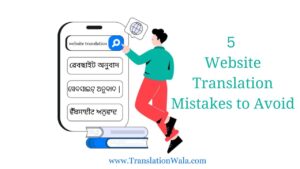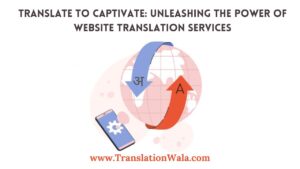In this age of digital connection that has never been seen before, the world is linking up more and more. Businesses aren’t limited to their own countries anymore; they can reach customers all over the world. Due to this, Website Translation has become an important tool for businesses that want to get more customers and enter new markets.
Why is Website Translation Important?
There are several compelling reasons why website translation is essential for businesses in the 21st century:
- Increased Market Reach: You can reach more possible customers if you translate your website into more than one language. This lets you reach new customers and raise knowledge of your brand around the world. Seventy-five percent of website visitors would rather see material in their own language, according to the numbers.
- Enhanced Customer Experience: Visitors from other countries will have a good time on a website that is well translated. This builds trust and gets people to interact with your business, which leads to more conversions and sales.
- Improved Search Engine Optimization: You can get a better ranking in search engine results pages (SERPs) for foreign searches if you translate the text of your website. This brings more possible customers to your business by increasing organic traffic and website exposure.
- Boosted Brand Reputation: A properly translated website shows that you care about buyers from other countries and makes your brand look professional and reliable. This can make people more loyal to the brand and spread good word of mouth.
- Competitive Advantage: In a market that is becoming more international, translating your website can help you stand out from your rivals. By providing a platform in more than one language, you show that you are serious about going global, which could bring in customers who would otherwise go to competitors that offer localized services.
Also Read: Indian Language Translation API – A Must-Have for Businesses
The Future of Website Translation
Website Translation has a bright future thanks to a few main trends:
- Machine Translation Advancement: Machine translation (MT) is getting smarter and better at translating words and phrases. This technology speeds up and lowers the cost of translating websites, so companies can translate material into many languages at once.
- Artificial Intelligence Integration: Website translation tools are getting artificial intelligence (AI) added to them, which will make the texts even better and more accurate. AI can also make the experience more unique for each user by adapting material to their location and tastes.
- Rise of Multilingual Content Management Systems: Businesses can handle and change translated website content more easily with the help of multilingual content management systems (CMS). These tools make the process of translating easier and make sure that all languages are translated the same way.
- Increased Focus on Localization: Translation on websites is changing into more than just translating words. Businesses today are focused on localization, which means changing material to fit the unique culture needs of each market. This makes sure that the website speaks to people in the area and gets them involved.
- Personalized Content Delivery: AI-powered tools let users get personalized material based on their location, preferred language, and viewing experience. In the future, this very customized experience will be more and more important for translating websites.

Best Practices for Website Translation
Businesses should follow these best practices when translating their websites for the best results:
- Partner with a Professional Translation Service: Choose a translation firm that has a good reputation, has experience translating websites, and is knowledgeable in the languages you want to translate into.
- Focus on Quality: Prioritize quality over speed. Make an investment in human translation services for information that is of essential importance, and employ machine translation for stuff that is less sensitive.
- Consider Cultural Differences: In order to cater to the cultural norms and expectations of your target audience, you need modify the content of your website.
- Optimize for Search Engines: To guarantee that your website has a high ranking in foreign search engines, you should do keyword analysis and take use of localization procedures.
- Track and Analyze Results: In order to evaluate the effectiveness of your translation efforts, you should keep track of the traffic, conversions, and user interaction on your website in a variety of languages.
Also Read: Reach and Engage India’s Regional Market
Conclusion:
Any business that wants to stay in business in the global market needs to Website Translation. It’s no longer a nice-to-have. can reach new customers, make the shopping experience better for them, and build a strong brand image around the world by using this powerful tool. Website translation tools that are even smarter and more useful will likely appear as technology keeps getting better. It will be easier for businesses to connect with people all over the world with these options, which will help them reach their foreign growth goals.



